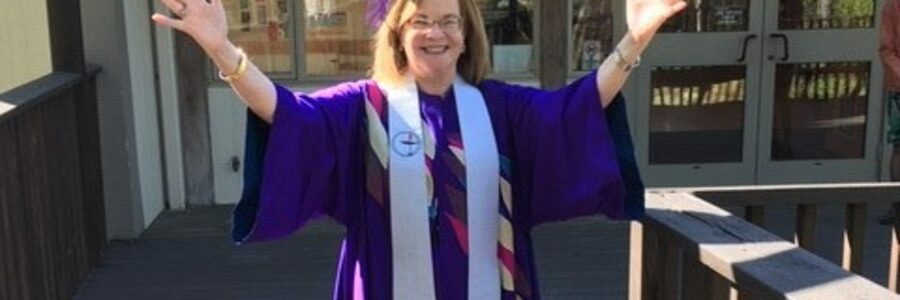
Lights, cameras and Zoom preaching: How I kept my church connected during a year of COVID
It’s been more than a year since I’ve seen my congregants in person. More than a year since we held our last in-person church service, since I’ve visited a congregant in the hospital, held a dying congregant’s hand, or cried with a new widow. It’s been more than a year since my church, and tens of thousands of others, had to learn almost overnight to create worship on Zoom, Facebook and YouTube.
Although some religious leaders have gotten headlines by denying the COVID virus and continuing to hold services and rallies, many of us spent the past year doing everything we could to keep our people connected and safe. We proclaimed early in the pandemic that while the building is closed, church is still open, and that while our faith may be worth dying for, in-person church services are not.
Surviving and thriving in the pandemic
In a few short weeks in March 2020, we bought ring lights, cameras, special microphones, and mastered the art of preaching on Zoom. We adapted liturgies and rites. Some of us learned to do communion and Ash Wednesday outside from six feet away. We conducted funerals, weddings and baby dedications on Zoom, surprising ourselves at how intimate and sacred the rites still felt. The Spirit was present despite the distance. We learned to create meaningful holidays online — we got through the Jewish High Holidays, Eid and Christmas, and are planning our second online Easter and Passovers. I think we would enjoy the creativity if the situation wasn’t so apocalyptic.
Rev. Debra W. Haffner's remote worship recording set-up at the Unitarian Universalist Church in Reston, Va. (Photo: Family photo)
We did everything we could to stay connected. Congregants created phone trees to check in on each other; last spring, every family in my congregation was contacted every week at home. This fall, we created neighborhood circles so people could shop for each other in case of illness and drop off encouraging notes. We held drive-throughs to continue our donations to neighborhood food banks, raised money through online collections for organizations that serve our neighbors, and held small group meetings of under 10 people outside, socially distanced and masked, in our parking lots.
Nothing to see here: For most churchgoers, controversy between religious freedom and public health is not real
Surprisingly, many of our congregations have not only survived but thrived and transformed during the pandemic. We have many more people attending services remotely than we did in person. Attendance at our worship services is 50% higher than it was pre-COVID. We have had 15 people officially join my church as members; none of them have ever been in our church building. People who are ill, elderly or had moved away from our area now join us each week. I have a suspicion that at least some of my congregants prefer watching worship on their sofas, drinking coffee and eating breakfast, and maybe muting my sermons.
Rev. Debra W. Haffner at Unitarian Universalist Church in Reston, Va., Easter 2019. (Photo: Family photo)
Our individual congregants have not fared as well. So many are lonely. Prior to COVID, mine was often the only hug some of my single congregants received each week. Some of them haven’t been touched by someone else in more than a year. Mental health issues have been exacerbated. So many of our congregants are experiencing financial hardship and insecurity. Many are wrestling with parenting, vocational and relationship issues. For every couple that feels closer from quarantine, another is contemplating divorce. I’ve done more pastoral care in the past month than in any month that I can remember. Everyone is tired of living like this, Including your minister, rabbi or imam.
Love, hope and our faith held
We want to come back to in person worship, but no, we are not going to have church just for the people who have been vaccinated. Our commitment to full inclusion and equity means that we will only come back when all can attend, either in person or virtually.
Holding together lives: In Chattanooga, faithful persevere as coronavirus, tornadoes hit
Congregations like mine are working to obtain the technology to stream services and to assure that our spaces are well ventilated. Nothing feels easy, including the emails and calls wanting to know why we aren’t already back in the building if the numbers are going down. The confusing and contradictory messages haven’t helped. Nor has it helped that clergy weren’t considered a priority group for vaccines. In Virginia, we’re at the bottom of the IB priority list; we’re still not eligible.
Yet despite everything, our faith held. So did love and hope. Belonging to a beloved community got many of us through this past year. As it will get us through the months ahead.
Rev. Dr. Debra W. Haffner is the settled minister at the Unitarian Universalist Church in Reston, Virginia. Follow her on Twitter: @revdebra
You can read diverse opinions from our Board of Contributors and other writers on the Opinion front page, on Twitter @usatodayopinion and in our daily Opinion newsletter. To respond to a column, submit a comment to [email protected].
Source: Read Full Article

